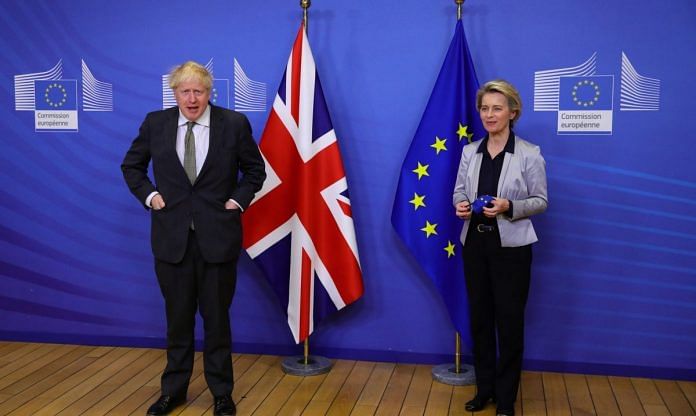London: The European Union is considering a fresh proposal on fishing rights from the U.K. as Prime Minister Boris Johnson aims to secure an 11th-hour trade deal.
Both parties had signaled over the weekend that they could make no further compromises, but on Monday the U.K. offered to give further ground if the EU backed down in other areas, according to people familiar with the negotiations. The latest suggestion from Britain would see the EU reduce the value of the fish it catches in U.K. waters by about a third. Last week the U.K. was insisting the EU accept a 60% cut.
The EU told negotiators on Friday that a 25% reduction was its final offer and this was already difficult for countries including France and Denmark to accept — the bloc had initially suggested 18%. The European Commission, which is handling negotiations on behalf of the 27 EU members, is liaising with national governments, particularly those that have big fishing industries, before responding, the people said.
The pound pared its earlier decline, but remained 0.3% lower on the day at around $1.3480.
After another day of intense talks between negotiators in Brussels as well as consultations with senior figures in London, Paris and Berlin, the two sides are still not ready to reach a conclusion and a deal won’t come on Monday, officials said. Indeed, officials say talks could still collapse over a major disagreement about how far one side can retaliate if the other breaks the rules.
Even if the two sides can bridge their differences on how much European boats will get — they are now haggling over as little as 33 million euros ($40 million) of fish annually — talks may still founder on the EU’s demand that they should be able to impose broader trade tariffs on the U.K. if London rows back on any fisheries agreement, a concept known as cross-retaliation. The U.K. has said it would accept penalty tariffs on fisheries but not in other areas.
The U.K. has demanded the EU accept a five-year transition to the new arrangement rather than seven, the people said. The EU had initially called for 10 years to adjust and the U.K. had proposed three.
“There have been successive proposals from the U.K., sometimes on fishing, that don’t respond to European priorities and demands,” French Europe Minister Clement Beaune told reporters in Paris. “Difficulties remain, in the fishing sector — but not only, so it would be a error of judgment and unacceptable stigmatization to say that a few countries or a few sectors are blocking.”
The British see control of their fishing waters, previously under the jurisdiction of the EU, as a key element of the sovereignty that it is regaining with Brexit. For its part, the European side doesn’t want to give access to its single market without maintaining fishing rights in return.
Speaking at a press conference in London, Johnson said he spoke to French President Emmanuel Macron on Monday, but discussed the coronavirus crisis rather than Brexit.
“It’s vital that everybody understands that the U.K. has got to be able to control its own laws completely and we’ve also got to be able to control our own fisheries,” Johnson said. He reiterated that even if the U.K. failed to get a deal and traded with the EU with tariffs and quotas, the arrangement would be “more than satisfactory.”
Earlier in the day, the U.K. government reiterated that it would not seek to extend the post-Brexit transition period beyond Dec. 31.-Bloomberg
Also read: Brexit talks miss another deadline as wrangle over fishing waters, state subsidies drags on






